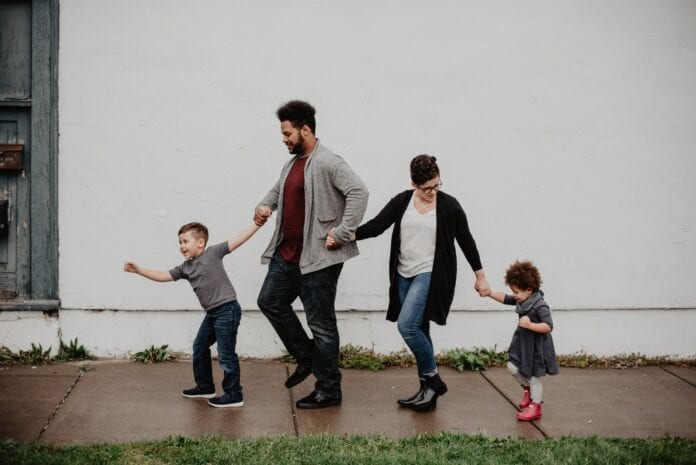Be well, be happy
Mental Health Awareness Week is the ideal opportunity to focus on psychological wellbeing – our own and our family’s. Emotional literacy means knowing how to talk about mental health and how to improve it and the best way to intervene when a loved one is struggling. Former primary school teacher and qualified play therapist Catherine Lynch of education resource experts PlanBee is here to help with a whole-family approach
The healing power of the natural world
Nature is the focus of this year’s Mental Health Awareness Week. Nature has more benefits than ‘just’ providing food and cleaning our air. Time spent connected to nature helps us feel grounded, it lowers our stress levels and can give us perspective on our lives. Slowing down and appreciating nature aids our ability to concentrate and improves our powers of observation.
Lockdowns and travel restrictions have meant many people have discovered a new found love of nature. Spending time walking around local areas has given us all the opportunity to notice and appreciate nature in a way we haven’t done before.
Whole-self mental health
Before you can take a whole-family approach to improving wellbeing, prioritise your own mental health. When you are struggling it makes it very hard to support others. Spend some time getting to know yourself and what makes you tick. When you know what winds you up and what helps you unwind you can recognise your triggers and do something about them before you flip your lid.
When you are finding something difficult don’t be afraid to talk to the people around you. It may seem obvious to you that something is annoying and a flash point of arguments, but don’t take it for granted others have noticed or feel the same way.
Make time for yourself; this doesn’t have to be a great big undertaking. Some days, five minutes of peace sitting on a bench will be enough. Other days, you might need more time. Listen to yourself and meet your differing needs as best you can.
Try not to make arguments into a battle with winners and losers. Apologise if you react badly to something, and explain what happened and why. Talk about your feelings and name flash points. Do your best to join the dots and give yourself and others an insight into your reactions.
‘When I came home, and I didn’t get a response to my greeting I felt really frustrated. I really dislike feeling ignored so I over reacted. I am sorry. I shouldn’t have shouted. Can we try that again?’
Whole-family mental health
Make time as a family when you can connect with each other
Turn screens off and tune into each other. You could go on a walk, play a board game, draw together. This time doesn’t have to involve spending money; often it’s the free, simple things are best. The more connected and in tune with each other your family are the easier it is to work together. When working as a team you will all feel more heard, supported and appreciated.
Make time to be playful
Play lowers stress levels, relaxes us and helps us to connect. Be spontaneous wherever possible and make the mundane fun. Remember the play should be fun for everyone, so take turns deciding what you will do and set boundaries you all keep to. Take time to catch falling blossoms, to blow dandelions, to watch ants marching, to be silly.
Make time to be relaxed in each other’s company
As life slowly starts to return to normal try to hold on to some of those moments of calm stillness we experienced during lockdown. When lives are overly scheduled we lose the time to pause and think: this time is so important for our mental health and general wellbeing.
Model the behaviour you would like your children to copy
The more you practice naming and explaining feelings the better you and your children will become at regulating your emotions. Emotional literacy is really important. Give your children the vocabulary and skills to name, recognise and understand their emotions.
Set boundaries you all understand
If trips out are stressful, try to work out why. If getting your children out of the front door leaves you exhausted, help them to feel excited about the trip and enlist their help with the planning and preparation. If your children go too far away from you when out, explain why they need to stay in view. If your children don’t want to return home, give them clear time warnings and help them come up with some ideas of what they might do when you get home.
Don’t be afraid to learn together.
Learn regulation techniques, learn synonyms for emotions, try, fail and succeed together and develop a growth mindset. Teach your children one of life’s most important lessons: no one knows everything and that is ok. According to Friends of the Earth, ‘Seven out of 10 people admit they’re losing touch with nature. And more than a third of parents admit they could not teach their own children about British wildlife.’ So get yourself a bird identification sheet, a British wildflowers identification sheet or a minibeast identification sheet and start learning together outside.
Whole-school mental health: checklist
This last school year has been like no other. Children have experienced huge disruptions to their education, and one of the biggest changes has been reduced social contact. Play is the work of children. Schools should be places that value play and playfulness, incorporating it into the school day where possible.
Think about your children’s schools’ policies and whether they foster an environment of authoritative acceptance. Hallmarks of a school where this is happening:
- Children know the boundaries in school and the reason for them
- The school meets the needs of children both academically and emotionally
- The school adapts to a child’s individual needs as they arise
- The school builds relationships on trust
- The school has a restorative behaviour focus rather than relying on punitive punishments and withholding rewards
- Children are supported to learn from their mistakes
- Children are encouraged to be curious.
Emotional literacy should be embedded in the school and all staff trained to support children’s mental health.
Ideas for teachers
English schemes like the Emotional Menagerie and lessons focusing on fulfilled lives are great places to start. Make emotions the focus of your PSHE lessons by seeing what discussions arise from these Photo Emotions Cards and encourage children to use a range of Emotion Synonyms in their lives.
The power of empathy
If you just make one lasting change this Mental Health Awareness Week, become more empathic. Respond to your own emotions, and the emotions of others, with understanding. Try to work out where the emotions came from and don’t forget to take as
Help keep news FREE for our readers
Supporting your local community newspaper/online news outlet is crucial now more than ever. If you believe in independent journalism, then consider making a valuable contribution by making a one-time or monthly donation. We operate in rural areas where providing unbiased news can be challenging. Read More About Supporting The West Wales Chronicle


























